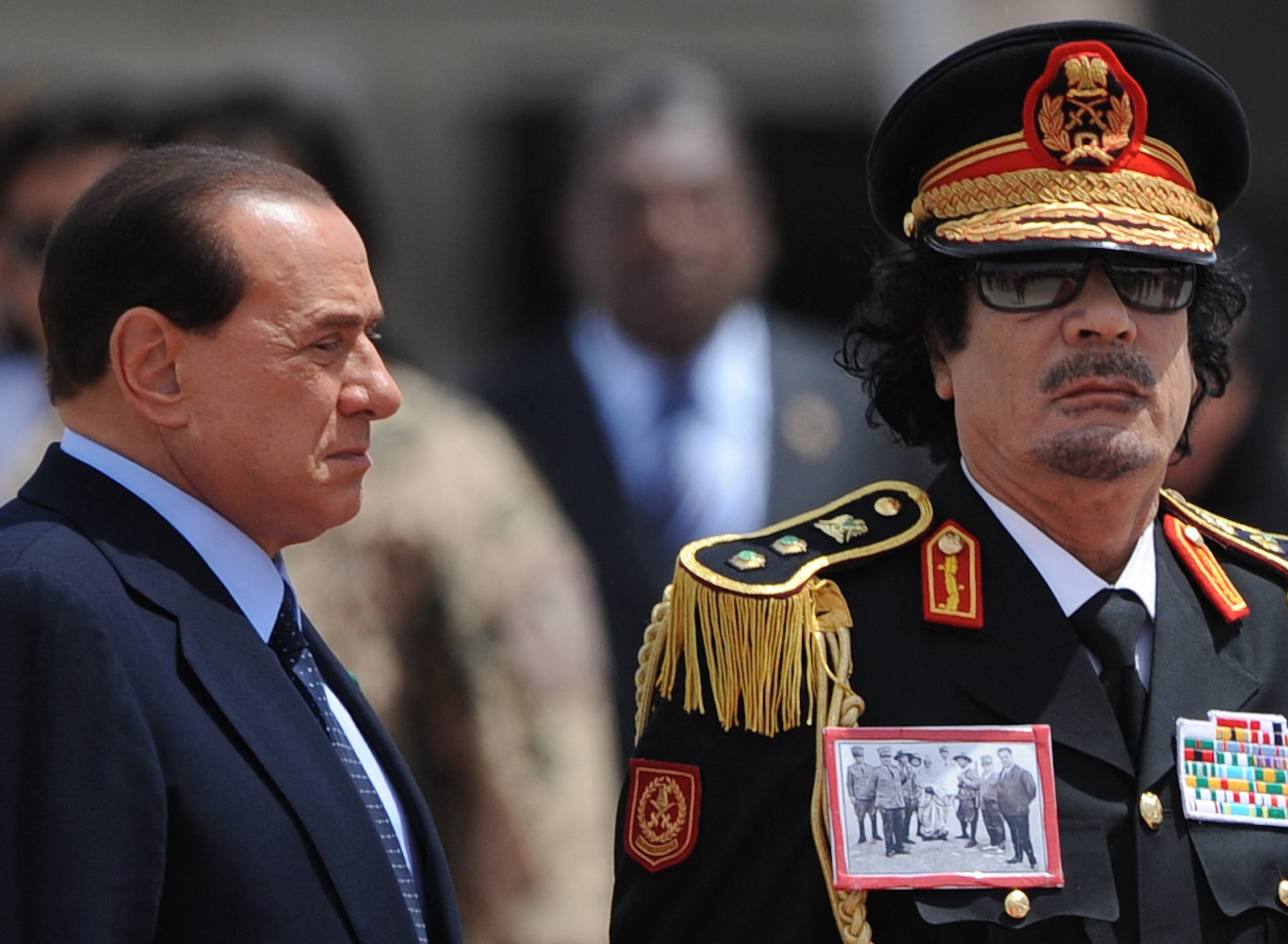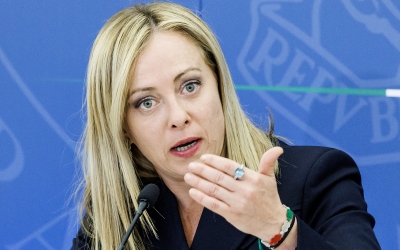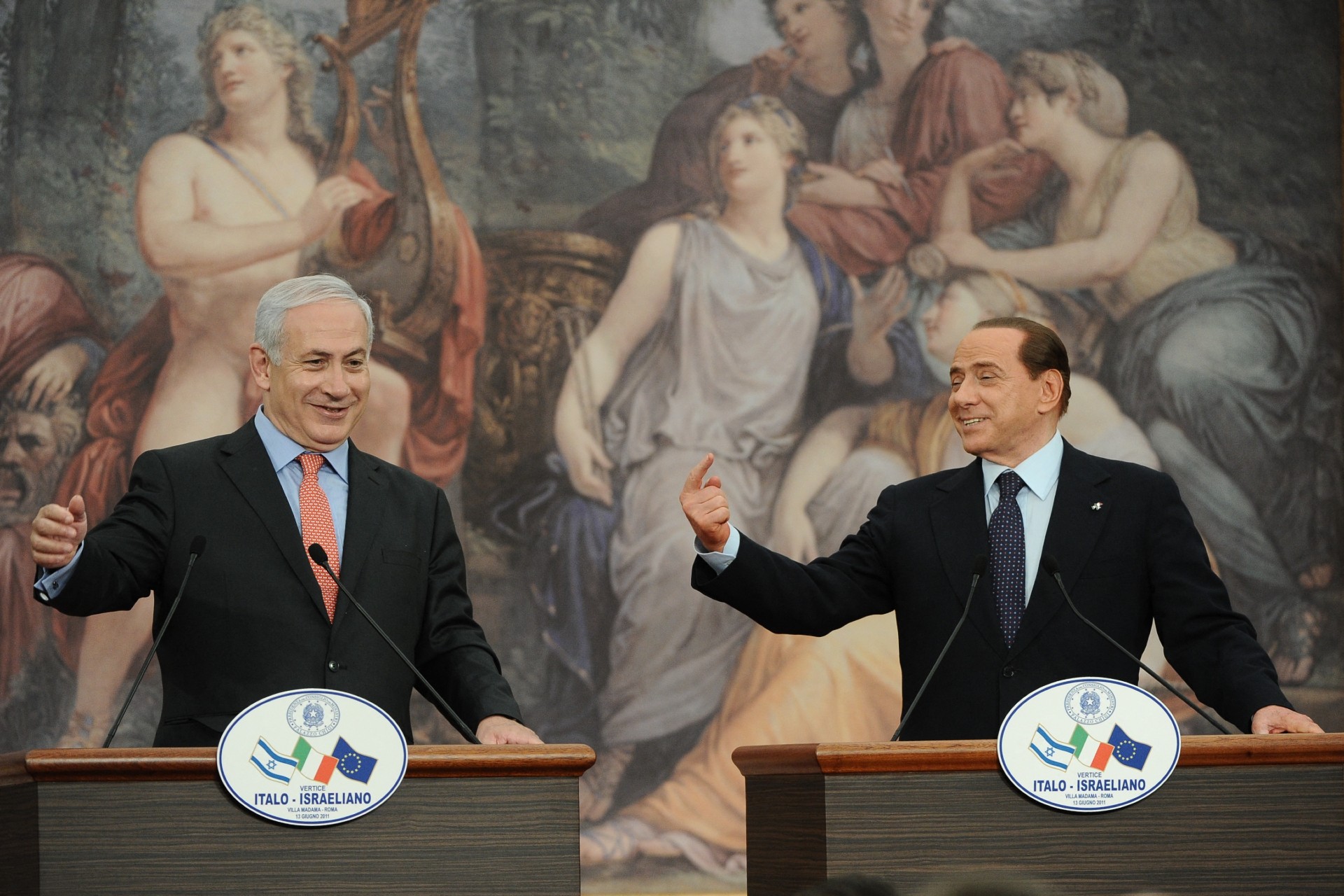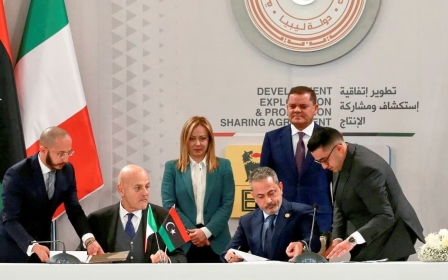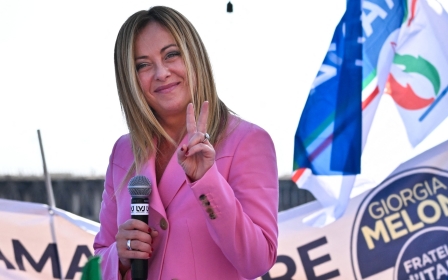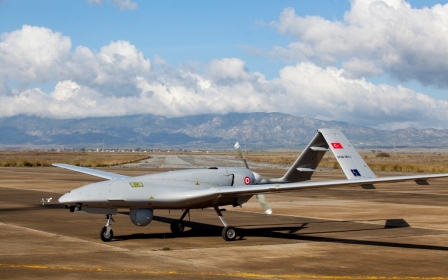Silvio Berlusconi and the Middle East: Gaddafi, Iraq war and Israel
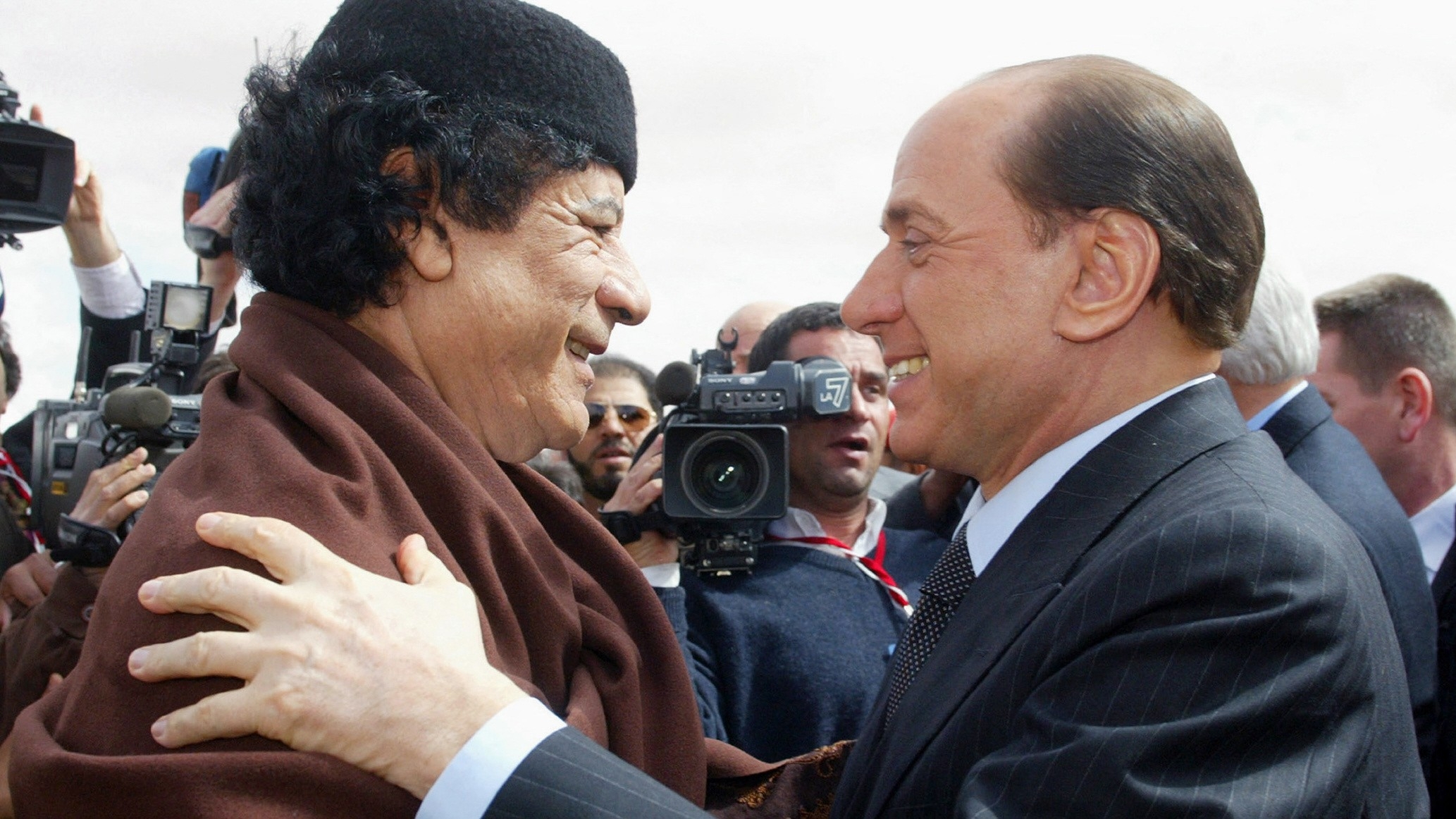
Silvio Berlusconi, Italy's former prime minister, died on Monday aged 86.
The billionaire media mogul, and the country's longest-serving premier, built up a huge empire in media, real estate and football, before launching a political career in 1994.
He was prime minister across three different terms between 1994 and 2011, totalling nine years in charge.
His time in office was characterised by populist policies and rhetoric, frequent gaffes and outbursts, and a number of sex scandals and allegations of wrongdoing, many of which resulted in legal proceedings.
He died in Milan after being treated in April for a lung infection linked to chronic myelomonocytic leukaemia.
New MEE newsletter: Jerusalem Dispatch
Sign up to get the latest insights and analysis on Israel-Palestine, alongside Turkey Unpacked and other MEE newsletters
From cancelling a meeting with King Abdullah of Jordan to "attend a party with Vladimir Putin", to kissing the hand of Libya's Muammar Gaddafi, Berlusconi had a colourful and controversial relationship with the Middle East and North Africa during his terms in office.
He vocally supported the US-led invasion of Iraq, which he later claimed to have opposed.
He also had a notoriously close relationship with Gaddafi, but would later be part of the coalition of forces that helped to bring down the government of the late Libyan autocrat.
By far his biggest controversy related to the region involved a sex scandal with an underage Moroccan dancer who Berlusconi falsely claimed was the granddaughter of Egypt's then-president.
Middle East Eye takes a look at some of the key moments in Berlusconi's dealings with the region.
Gaddafi
After Gaddafi took power in a 1969 coup, he repeatedly took aim at Italy over its 1911-43 repressive colonial rule of Libya.
So when he stepped off the plane in Rome in 2009 to be greeted by Berlusconi, it was a historic visit on many levels.
For one, Gaddafi was accompanied by the son of Omar al-Mukhtar, a Libyan revolutionary hero who had been executed by Italian authorities in 1931 for leading the resistance movement against Italian colonial forces.
“For us, that image is like the cross some of you wear,” Gaddafi told reporters while wearing a picture of Mukhtar being captured by Italian fascist soldiers.
The epic Gaddafi-funded film Lion of the Desert, about Mukhtar’s life, was screened on Italian television upon the Libyan leader's visit, after having been banned since 1982 for “damaging the honour” of the Italian army.
Gaddafi also brought an entourage of 300 with him, pitching a Bedouin-style tent in a 17th-century palace in the Italian capital.
The trip - Gaddafi's first to Rome - typified the close relationship between Berlusconi and the Libyan ruler, who had long been maligned in the West over allegations of directly and indirectly supporting terrorism.
A year earlier, the two had agreed to a deal in which Italy would compensate Libya for the hardships of colonialism to the tune of $5bn in infrastructure projects, in return for Tripoli intercepting those trying to cross the border to Italy.
During one meeting at the Arab League summit, Berlusconi even kissed his Libyan counterpart's hand - a gesture which sparked backlash in Italy.
The relationship was more than just symbolic: in 2004 the two leaders inaugurated the Greenstream gas pipeline, which runs from Wafa in Libya to Sicily in Italy. It remains the longest underwater pipeline in the Mediterranean.
At the height of the leaders' close ties, Libya’s government owned shares in Italy’s stock market and several major companies, and even owned part of the Juventus football club. Meanwhile, Libya was Italy's largest oil supplier.
Those close ties came crashing down during the Libyan uprising of 2011 which toppled Gaddafi.
'I have been surprised by the attitude of a friend with whom I have sealed a treaty of friendship that benefits both our nations'
- Gaddafi in a letter to Berlusconi
At first, Berlusconi claimed he could “convince him to go into exile” and negotiate “an honourable exit from the scene” for the man who ruled Libya for 42 years.
"I'm saddened for Gaddafi and I'm sorry," Berlusconi said in March 2011. "What's happening in Libya hits me personally."
Despite his sorrow and regret, the no-fly zone imposed over Libya in 2011 was launched from Italian soil at a Nato base in Naples. It was only months earlier that Berlusconi was kissing Gaddafi’s hand.
According to reports, Gaddafi sent a letter to Berlusconi pleading for Italy’s help in his last months.
“I have been surprised by the attitude of a friend with whom I have sealed a treaty of friendship that benefits both our nations,” the letter read.
“I would have hoped that at least you would have been concerned at the facts and would have attempted a mediation before adding your support to this war.”
After Gaddafi was eventually captured, killed and dragged through the streets, Berlusconi commented with the Latin phrase: "Sic transit gloria mundi" (thus passes the glory of the world).
Support for Iraq war
Berlusconi backed the US-led invasion of Iraq in 2003, despite the majority of Italians being against it.
He lent support to his American and British counterparts George Bush and Tony Blair, stating: “Today the West is the only military power, and within the West, there is the incomparable super military power of the United States”.
“And today we ask if it should be possible, looking to the future, to intervene as exporters of democracy and freedom in the whole world.”
Two years earlier, he had caused international outrage among Muslim countries, following the 11 September New York attacks, when he described western civilisation as "superior".
“We should be conscious of the superiority of our civilisation, which consists of a value system that has given people widespread prosperity in those countries that embrace it, and guarantees respect for human rights and religion," he said. "This respect certainly does not exist in the Islamic countries.”
Despite domestic criticism, Berlusconi impassionately defended US actions in Iraq, even citing the American defence of Europe during World War II.
He used that defence to state that it was “unthinkable” for him to reject Bush’s request for an Italian military presence in Iraq.
''Everyone should have the awareness of owing gratitude to the great American democracy,” he said.
Italy did not supply troops for the initial invasion in March 2003 but sent 3,000 soldiers after the fall of Baghdad weeks later.
In 2005, however, Berlusconi claimed that he repeatedly tried to talk Bush out of the invasion.
"I have never been convinced war was the best way to succeed in making a country democratic and extract it from an albeit bloody dictatorship," he said. "I tried on several occasions to convince the American president not to wage war."
The remarks were ridiculed by Italy's then opposition, who saw it as a cynical re-election tactic amid poor economic conditions and backlash over his foreign policy.
Pro-Israel stance
Berlusconi was one of the most pro-Israeli leaders in Europe during his tenure, even touting Israeli membership of the EU.
In the 1980s, the Italian government had been relatively pro-Palestinian.
Former President Sando Pertini used his end-of-year address in 1982 to talk about the murders of Palestinian refugees in Sabra and Shatila during the Lebanese civil war, while former socialist Prime Minister Bettino Craxi defended the Palestinian armed struggle in 1985.
But Berlusconi staunchly supported Israel, describing it as “not only the biggest example of democracy and liberty in the Middle East, but the only example”.
In 2010 he said that he considered Israel to be a European country, and "dreamed" of its membership in the EU.
“As long as I am one of the shapers of politics, my greatest dream is to include Israel among the European Union countries,” he said.
He opposed attempts for “unilateral recognition of Palestine” unless a unified Palestinian government denounced terrorism and accepted Israel’s right to exist, and vowed to fight against any such attempts in Europe.
He has occasionally come under criticism from some Israeli quarters too, particularly over comments related to fascism in the 1930s.
In the European Parliament in 2003, he told a German politician that he would be “perfect” for the role of a concentration camp guard.
He also offered praise towards fascist leader Benito Mussolini, who he once claimed “did not kill anyone”.
Thousands of Italian Jews were deported during the Holocaust, according to data compiled by historian Liliana Picciotto Fargion, many of whom were killed in concentration camps.
'Ruby-gate'
One of the biggest scandals during Berlusconi’s time in charge involved Moroccan dancer, Karima el-Mahroug.
Berlusconi was accused of paying to have sex with Mahroug, known by the nickname "Ruby the heartstealer", in early 2010 when she was 17 years old.
Mahroug told reporters at the time that she had been given 7,000 euros and jewellery during a dinner held by the then-prime minister at his mansion near Milan. Both Mahroug and Berlusconi denied having had sex.
The Moroccan was later arrested at a police station in Milan after being accused of theft.
The police officer in charge of the inquiry said that he received a call from Berlusconi, who had falsely claimed that Mahroug was the granddaughter of then-Egyptian President Hosni Mubarak.
The mogul was convicted in 2013 and sentenced to seven years in prison and banned from public office after being charged with paying for sex with an underage woman. But the conviction was overturned upon appeal a year later, and he once again became eligible to run for office.
So-called "bunga bunga parties", in which young dancers and models were invited to Berlusconi’s residence in Milan for wild gatherings reportedly resembling orgies, were a feature of the Italian prime minister’s personal life.
He faced several legal cases involving the parties, on charges ranging from corruption to tax fraud and underage prostitution, but they were all either dismissed or overturned on appeal.
This article is available in French on Middle East Eye French edition.
Middle East Eye delivers independent and unrivalled coverage and analysis of the Middle East, North Africa and beyond. To learn more about republishing this content and the associated fees, please fill out this form. More about MEE can be found here.


